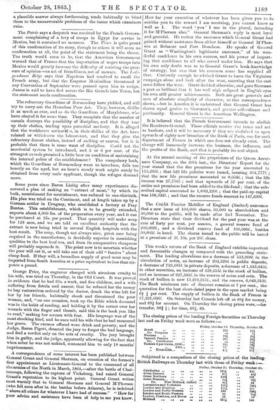A correspondence of some interest has been published between General
Grant and General Sherman, on occasion of the former's first appointment as Lieutenant-General to the command of all the armies of the North in March, 1864,—after the battle of Chat- tanooga, following the capture of Vicksburg, had raised General Grant's reputation to its highest point. General Grant writes most warmly that to General Sherman and General M'Pherson (who fell soon after in the battles before Atlanta), he is indebted "above all others for whatever I have had of success." "How far your advice and assistance have been of help to me you know. How far your execution of whatever has been given you to do entitles you to the reward I am receiving, you cannot know as well as I. The word 'you' I use in the plural, intending it for M'Pherson also." General Sherman's reply is most loyal and grateful. He recites the successes which General Grant had gained without assistance from either himself or General M'Pher- son at Belmont and Fort Donelson. He speaks of General Grant as "Washington's legitimate successor," of his won- derful confidence in his own success, and his power of impart- ing that confidence to all who served uuder him. He says that his own only doubt was as to General Grant's book-knowledge of strategy, but sees that his common sense has supplied all that. Curiously enough he advised Grant to leave the Virginian campaign alone and look after the west, asserting that the east must follow the west. Grant decided otherwise, and gave Sherman a part so brilliant that it has well nigh eclipsed in English eyes his own still greater achievements. Both are great generals and men of absolute simplicity of character, as this correspondence shows, —but in America it is understood that General Grant has shown equal genius to Sherman's, and greater self-reliance and pertinacity. General Grant is the American Wellington.






























 Previous page
Previous page